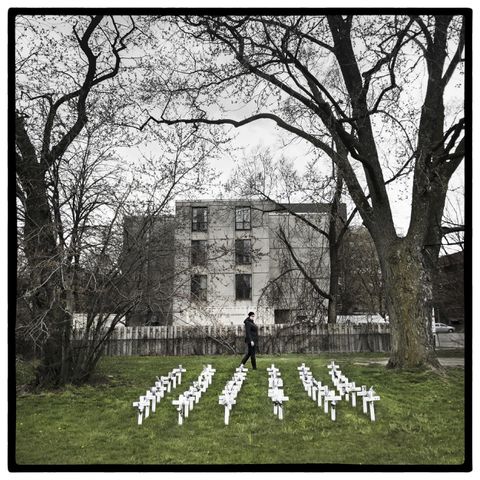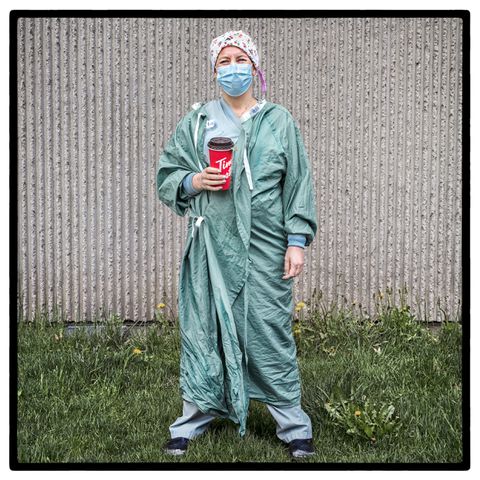Reading Canada’s coronavirus outbreak in the faces of Toronto’s citizens

A woman looks at a cross memorial set up outside the Camilla Care Centre in Mississauga, Ontario. Her mother was one of 60 residents who have died of covid-19 at the care facility located outside Toronto. The crosses were installed in a green space by relatives to remember the victims at the home since the start of the pandemic. Nearly 1,200 long-term care residents have died in the province of the virus. (John Hryniuk)

“I haven’t seen people this sick in my 25 years on this job,” said Shannon, a nurse who works with covid-19 patients in the ICU at St. Michael’s Hospital in downtown Toronto. Shannon has words for those who think this pandemic is fake or overblown: “Protect yourself and follow what the government says! That way you’re protecting not only yourself and others but the front-line workers as well, and we can be done with this virus.” She was photographed on a break from her 12-hour hospital shift holding her “fuel.” (John Hryniuk)
When the pandemic struck, I, like most others, watched from afar the trials of front-line workers — the creased faces of doctors and nurses who had spent endless hours on their wards treating patients.
In Canada, no one was covering this event from a perspective anyone could relate to. I took up this personal challenge with a single camera, a lens and my bicycle. From that, the “Urban Covid-19 Portrait Series” was born.
On my first day, I captured a woman praying on her knees in front of large, latched, black iron gates to a closed Catholic church. The project grew as I noticed urban life evolving before my eyes day after day and how different we Canadians were compared with the rest of the world. We took our social distancing, lineups and face masks very seriously and worked together to make sure Canada would flatten this curve.
At the end of four months, I had cycled all over the city and amassed over 800 kilometers (about 250 miles), two flat tires and two brake cables. Recording this look at how Toronto worked together during this pandemic was inspiring.
An outdoor installation of this work is on display from July 8 to Sept. 8 at the Drake Hotel, 1106 Queen St. West, Toronto, and is presented by Magenta and Partners in Art and the Drake Hotel, SkyGrid and Saman Designs.

Shoppers line up with their carts outside a Costco store in northern Toronto at a social distance while waiting in line to enter the store before it opened. (John Hryniuk)

Iman has been out of work as a personal-care worker for three months, and said it “makes her sad.” While she does get the emergency financial assistance from the government she likes to be busy. “I don’t like to stay at home I want to work.” she explained with a tone of desperation. “I’m happiest when I’m busy.” (John Hryniuk)

Svente Appelkvist wears pink pants, pink jacket and a pink Panama hat while waiting in line to go grocery shopping in downtown Toronto. (John Hryniuk)

Fashion historian and professor at Ryerson University, Alison Matthews David, said the covid-19 pandemic will change the fashion landscape but it is “impossible to predict” how. David added that the post-pandemic fashion landscape may include a renewed interest in clothing. This concept has been seen before following other major global events, including the Great Depression, the Second World War and the 1918 Spanish influenza. “During the Second World War, because clothing was rationed, and certainly a lot of things like wool or silk were needed for uniforms and for the war effort, people got very creative essentially with what they wore,” David said. “A lot of women still did home sewing, and so, there were lots of patterns and advice on how to turn one thing into another.” (John Hryniuk)

Devine Darlin is one of Toronto’s top drag queens and she is “fierce” (she poses here in a ninja stance against the virus). She has won many titles such as Miss Gay Toronto, Miss Gay Universe, Toronto’s Next Drag Superstar and the first Miss Crews and Tangos. Devine can be seen performing on the village strip in Toronto every week when the bars where she works are actually open. She hates being away from the stage and the limelight it brings, along with the income, as this is a full-time job for her. She really misses her friends, and it saddens her to not provide the joy and happiness for her many fans in the city, who usually flock to her shows in huge numbers every week. (John Hryniuk)

A man wears a stylish face mask with a mustache imprint on it in downtown Toronto. New styles of face masks are hitting the market now that many places are making it mandatory to wear them. (John Hryniuk)

The pandemic has affected us all in some way or another, but many of the hardest hit are the self-employed. Melanie works as a freelance photographer, and with work slowing down, she decided to start making reusable face masks out of her home. (John Hryniuk)

Dominique is employed in social work, and part of her job involves outreach. “The pandemic has made my job harder to be in contact with other agencies,” she says. Getting the word out about her programs has forced her to be more creative at her job. (John Hryniuk)

Patrica shows off her style while on her way to the supermarket in downtown Toronto. Wearing a mask is mandatory to enter most stores in the city. (John Hryniuk)

A woman kneels as she prays in front of St. Michael’s Catholic Church in downtown Toronto. Because of covid-19, parishioners aren’t allowed into the church. (John Hryniuk)

Plastic bags cover the empty wheelchairs and walkers of some of the 50 residents who have died of covid-19 over the past three months at the Camilla Care Centre in Mississauga, Ontario. (John Hryniuk)
In Sight is The Washington Post’s photography blog for visual narrative. This platform showcases compelling and diverse imagery from staff members and freelance photographers, news agencies and archives. If you are interested in submitting a story to In Sight, please complete this form.
More on In Sight:
Intensely personal images show how a Bangladeshi family copes during the covid-19 pandemic
A photographer in Mexico uses an imperfect camera to document an uncertain time






